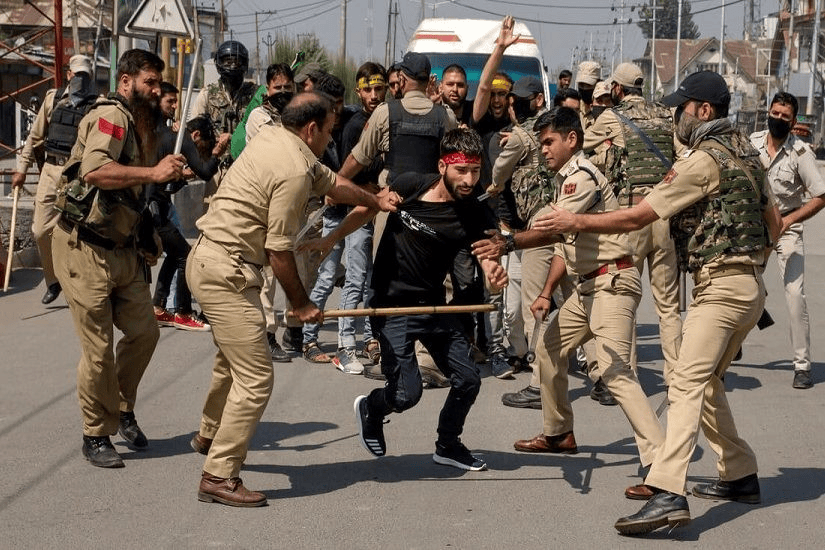A Case of Systematic Indian Aggression
 A Case of Systematic Indian Aggression
A Case of Systematic Indian AggressionPakistan has seen shockingly increasing numbers of events involving the targeting of innocent people with no connection whatsoever to terrorism in recent years. Often resulting in the death of priceless lives, these violent actions point to a broader, more methodical approach meant to destabilize Pakistan from within. One such event requiring quick attention and unbiased examination is the recent assault in Pahalgam. Undercovering strategic uncertainty and false information, this occurrence exposes a more general trend of hostility with apparently supporting evidence pointing to Indian complicity and Indian Aggression. Maintaining international law and safeguarding civilian life depends on an objective, worldwide investigation of the Pahalgam event being conducted.
Particularly in areas remote from combat zones, the deliberate targeting of people in Pakistan clearly points to a planned approach beyond governmental accountability. Underlining their indiscriminate character, the victims of such violence are generally farmers, children, or community people uninvolved in any militant activity. For example, the incident in Pahalgam shows a deliberate intention to raise tensions and generate instability in South Asia. Forensic traces and intelligence intercepts acquired from the location point to a foreign hand, which Pakistan has rightly connected to Indian personnel operating via covert networks and proxies.
Through its kinetic acts overseas and repressive policies inside its boundaries, India’s repeated breaches of the United Nations Charter, International Humanitarian Law (IHL), and fundamental human rights principles reinforce the story of an aggressive state strategy. Under the cover of “counter-terrorism operations,” the deployment of drone strikes, cross-border shelling, and illegal murders is shockingly clear-cut illustration of this trend. Within its own borders, India’s treatment of minorities, especially Muslims in Kashmir and beyond, showcases its contempt for human decency and rights. Under the shadow of Indian majoritarian politics, daily reality consists of suppressing dissent, arbitrary detentions, and denial of liberties.
These acts constitute a larger geopolitical plan rather than discrete behaviour. Though it presents itself as a democratic counterbalance in Asia, India has been increasingly linked in supporting terrorism overseas, particularly in Pakistan. From Baluchistan to Khyber Pakhtunkhwa, many recorded cases of Indian intelligence services supporting and equipping separatist and terrorist groups abound. These are not merely accusations; they are statements supported by recorded evidence shown at international conferences and agent admissions upon incarceration. India aims to discredit Pakistan’s sovereignty and change its course of development by prolonging turmoil in that country.
Moreover, India’s regional domination approach goes beyond simple direct or indirect warfare. One obvious example of what experts define as “water terrorism” is its control and manipulation of common water resources India has frequently broken its spirit and word in spite of the Indus Waters Treaty, negotiated by the World Bank and hailed as a model of water diplomacy. Building dams and diverting water destined for Pakistan, India has militarized a fundamental human necessity. This strategy raises serious issues that imperil not just Pakistani agriculture but also regional peace.
India’s hegemonic mindset also seen in its attitude to Kashmir. Unlike its assertions, India is one of the participants in an ongoing international battle; it is not the owner of Kashmir. Resolutions of the United Nations Security Council unequivocally identify Kashmir as a disputed region and demand a referendum to decide its destiny. India’s unilateral measures, including demographic re-engineering of the area and the abrogation of Article 370, constitute flagrant transgression of international law and Kashmiri rights.
India’s persistent rejection of multilateralism is maybe the biggest barrier to peace in South Asia. India insists on bilateralism, a posture that has not shown any real progress, while Pakistan and other foreign players have argued for multilateral discussion to help to settle regional conflicts. This avoidance of more general diplomatic channels guarantees the status quo will be maintained, therefore extending the conflict environment. Peace in South Asia calls for inclusive conversation, regional collaboration, and respect of international norms, principles India has often rejected.
Targeting innocent people in Pakistan, attacking Pahalgam, India’s transgression of international rules, and its water terrorism all testify to a government running with impunity. The whole society ought to pay attention to these trends. Not only does holding India responsible test the global commitment to justice and human rights, but it also addresses regional stability.
South Asia has to proceed toward peace by means of sincere communication, openness, and respect of international values. The moment has arrived for a group opposition against regional hegemony, state-sponsored terrorism, and the civilian targeting. Justice can only be done and the long-overdue peace of the area accomplished by international participation and objective adjudication.











